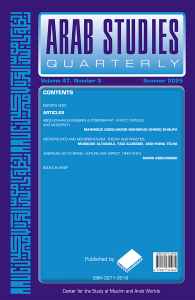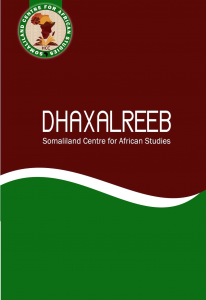Somaliland, climate change and arab studies
For the new Academic year we’re delighted to feature Dhaxalreeb, a journal from Somaliland, which is part of our African Journal Initiative, offering new perspectives on climate change. We’re also pleased to share the latest from Arab Studies Quarterly, our oldest and most established journal.
All of our journals are Diamond Open Access, meaning every article is free to read. You can see our whole collection and the archive on ScienceOpen and JSTOR.

In the lastest issue of Arab Studies Quarterly, Volume 47, Issue 1, Mahmoud Abdelhamid Mahmoud Ahmed Khalifa examines “Abdelwahab Elmessiri’s Autobiography: Affect, Critique, and Modernity”. The article explores Elmessiri’s journey to “Islamic humanism,” showing how his personal encounters with colonialism, secularism, and modernity shaped a decolonial critique rooted in both Islamic tradition and European thought.
Mubarak Altwaiji, Faiz Algobaei, and Muna Telha investigate how imperial powers employ necropolitics in “Necropolitics and Neo-Orientalism: Theory and Practice”. Focussing on West Asia and the Arab World and US foreign policy, and linking the discourse to death, the authors highlight how neo-orientalist narratives sustain cycles of war, exploitation, and hegemony in the region.
In “American Aid to Israel: Nature and Impact, 1949–2024” Samir Abed-Rabbo traces how US support for Israel grew from modest postwar assistance into the largest and most unconditional foreign aid programme in American history. By unpacking the financial figures and political motives behind this aid, the piece argues that US support sustains apartheid and genocide while undermining American democracy and international credibility.

Dhaxalreeb: Somaliland Centre for African Studies was established by the Redsea Cultural Foundation in Hargeysa. In the latest issue Volume 21, Issue 1, Richard Atimniraye Nyelade challenges dominant Somali nationalist narratives and genealogical myths that give value to Arab ancestry and nomadic heritage in his paper “Reclaiming African Heritage: Chinweizu’s Decolonial Lens on Gabooye Marginalization in Somaliland”.
In “Exploring Messaging on Climate Change Through the Somali Poetic Drama of the Poet Playwright Hasan Ganey (1982)” Nasra Dahir Mohamed investigates the reasons behind the effectiveness of this drama in mobilising awareness around climate change and how theatre serves as a tool for community awareness among Somalis.
Fathi Jama Dahir explores how Ahmed Ismail Hussein transformed Somali music with his unparalleled mastery of the Oud in his article “The Making of Hudeidi: Crafting an Icon of Somali Qaraami Music”.
In “We Have Not Seen Something Like This Before’: Cyclone Sagar and its Impact on Livelihoods in Northwestern Somaliland”, Moustafa Ahmad argues that Cyclone Sagar, May 2018, was the most devastating climate-related crisis to have hit Somaliland in contemporary history, warranting the use of a response mechanism different from the ones applied in the aftermath of droughts.
Tirsit Yetbarek examines several university-level climate change research projects in the Horn of Africa, with a particular emphasis on Ethiopia, Somaliland, and Kenya in “Universities and Climate Change Research Initiatives in the Horn of Africa”. Yetbarek makes the case that a concerted effort, led by academic institutions and research centres in the Global South, is required in light of the devastating loss of natural and human resources that the globe is currently suffering, which has a major influence on emerging nations.
Finally, Abdulhamid Abdulahi Ahmed makes some linguistic observations in his article “Linguistic Remarks on Modern and Old Harari Languages”.
You can find the archive of the Dhaxalreeb and the other journals in the African Journals Initiative on JSTOR.
Stay up-to-date with the latest research highlights by signing up to the Pluto Journals newsletter!

